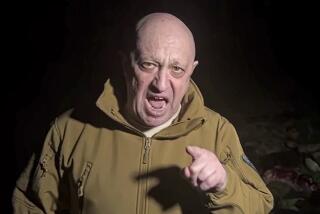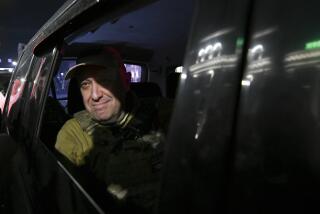Pyotr G. Grigorenko, Exiled Soviet General, Dies in N.Y.
- Share via
NEW YORK — Pyotr G. Grigorenko, a World War II Soviet general whose political views landed him in a psychiatric ward for five years but then to a new life in the United States, died late Saturday. He was 79.
Grigorenko’s son, Andrew, said his father died at Beth Israel Hospital in Manhattan of complications from a stroke suffered three years ago.
Pyotr Grigorenko, who Soviet authorities stripped of his military rank and later his Soviet citizenship, had lived in New York since 1977.
Having sacrificed his freedom for his political convictions, Grigorenko became the leading figure in a campaign against psychiatric detention of dissidents by the Soviet government.
As a young man, Grigorenko believed deeply in communism but became disillusioned by differences between Communist theory and Soviet practice, his son said. Nonetheless, he became a professor at a military academy before his doubts became known.
Class-Divided Society
Grigorenko became an outspoken dissident in 1961 with a speech at a party meeting, in which he accused Soviet leader Nikita S. Khrushchev of creating a class-divided society of privilege and power.
As a result of that speech, Grigorenko was quickly transferred to a less visible position and stripped of his military rank. He was later confined to Soviet mental hospitals because he campaigned for the right of Crimean Tartars to return home from Central Asia, where they had been exiled by Soviet leader Josef Stalin. He also campaigned for the rights of Ukrainians and other Soviet nationalities.
“My trouble was that I had the bad habit of thinking for myself,” Grigorenko said in an interview in May, 1975, a year after his release from five years in Soviet mental hospitals.
In the 1970s, Grigorenko helped found the Ukrainian-Helsinki Group and the Moscow-Helsinki Group, which unofficially monitored Soviet compliance with the human rights provisions of the Helsinki Accords.
Grigorenko came to the United States in December, 1977, to visit his son and undergo treatment for a prostate condition. During the visit, Moscow accused him of “carrying out actions incompatible with citizenship in the U.S.S.R.” and revoked his return visa, effectively denying his citizenship, the younger Grigorenko said.
Grigorenko continued dissident activities as an expatriate, forming the External Representation of the Ukrainian-Helsinki Group in the United States. He also became a U.S. citizen.
Though his health deteriorated seriously during his incarceration and his family, deprived of his pension, fell on hard times, he said he regretted nothing. “Everything has its price,” he said. “I agreed to pay that price.”
More to Read
Sign up for Essential California
The most important California stories and recommendations in your inbox every morning.
You may occasionally receive promotional content from the Los Angeles Times.













